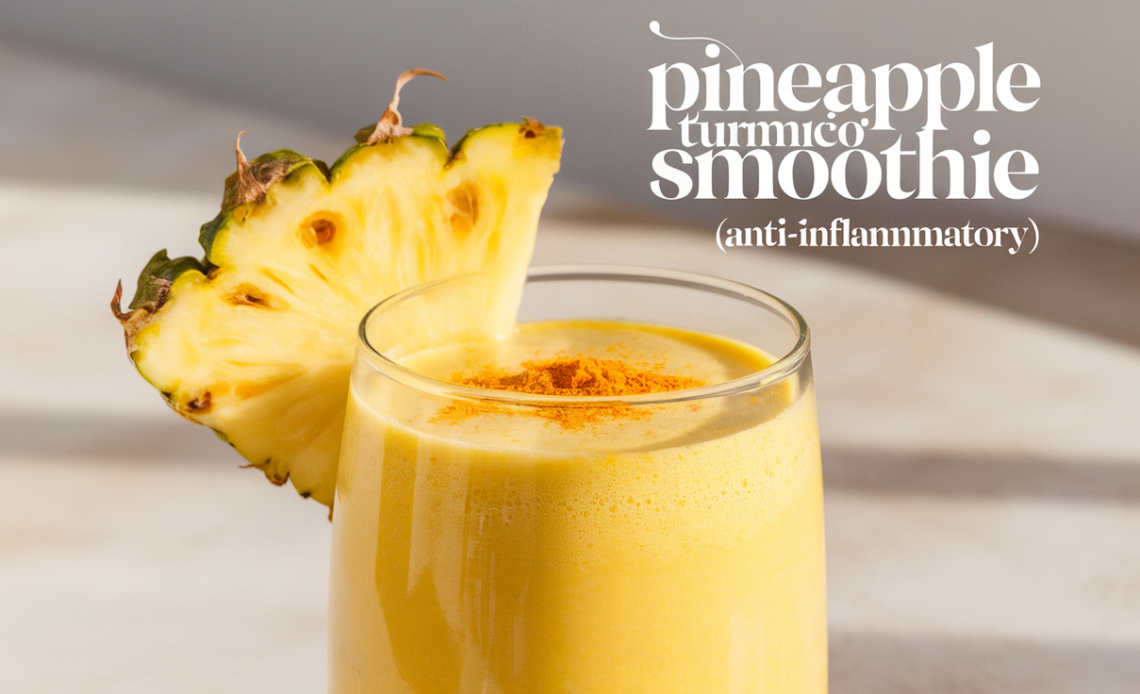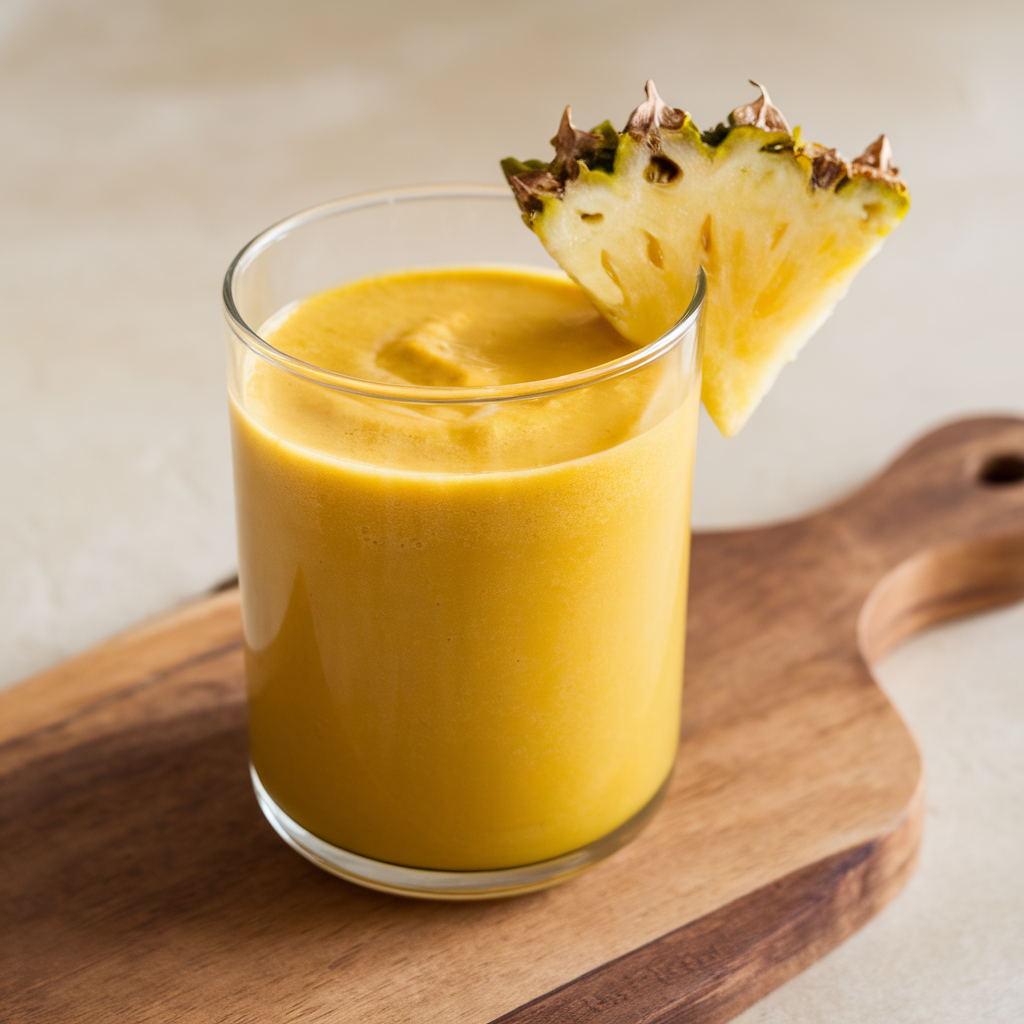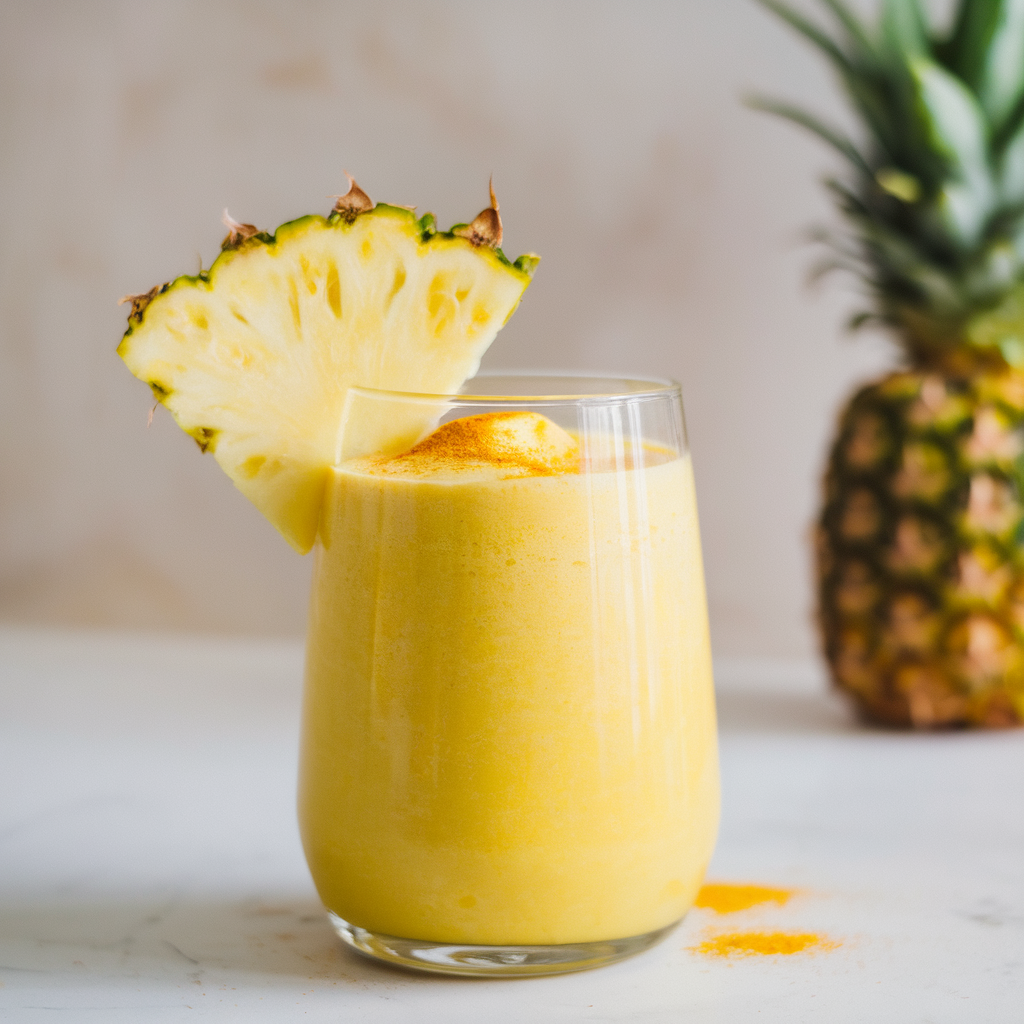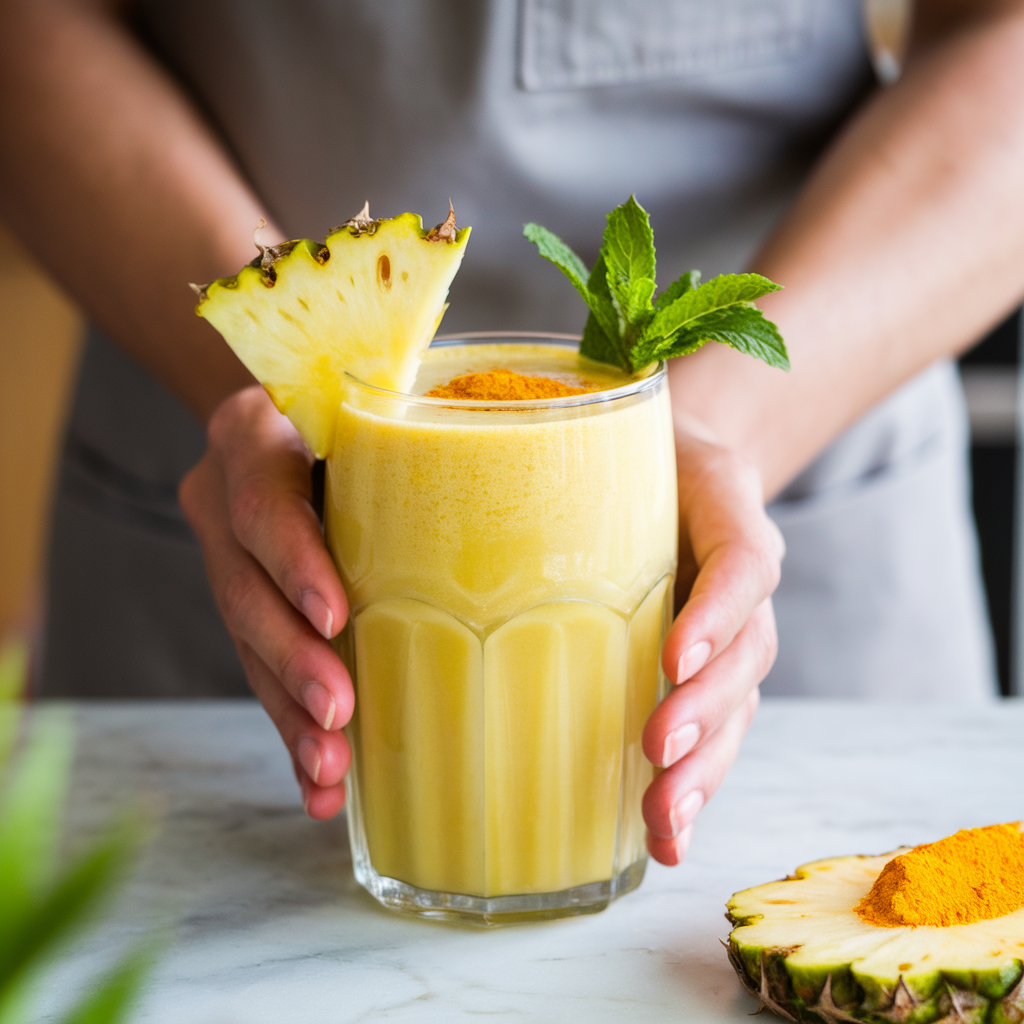
In today’s fast-paced world, maintaining a healthy diet is crucial for overall wellness, especially when it comes to managing inflammation. Inflammation, whether acute or chronic, can have a significant impact on our health, contributing to conditions like arthritis, heart disease, and autoimmune disorders. As more people become aware of the link between diet and inflammation, the demand for natural anti-inflammatory remedies, like turmeric and ginger, has surged. One of the best ways to incorporate these powerful anti-inflammatory ingredients into your diet is through smoothies. In this article, we will explore a vibrant and delicious anti-inflammatory recipe — the Pineapple Turmeric Smoothie — that combines the benefits of turmeric, ginger, and pineapple to help fight inflammation and promote overall health.
Understanding Inflammation and the Importance of an Anti-Inflammation Diet
Before diving into the recipe, let’s first explore the concept of inflammation and why incorporating anti-inflammatory foods into your diet is so important.
Inflammation is a natural response by the body’s immune system to injury, infection, or harmful stimuli. In the short term, inflammation helps the body heal. However, when inflammation becomes chronic, it can lead to a range of health problems, including cardiovascular disease, diabetes, and joint pain. This is why it’s crucial to adopt an inflammation diet that incorporates foods known for their anti-inflammatory properties.
Anti-inflammatory diets are rich in fruits, vegetables, whole grains, and healthy fats, while limiting processed foods, refined sugars, and unhealthy fats. Specific foods like turmeric, ginger, and pineapple are known for their powerful anti-inflammatory effects, making them excellent additions to any inflammation-fighting meal plan.
The Benefits of Pineapple, Turmeric, and Ginger
Let’s break down the three key ingredients in this smoothie: pineapple, turmeric, and ginger.

Pineapple:
Pineapple is a tropical fruit that’s not only delicious but also packed with nutrients. It is rich in vitamin C, antioxidants, and bromelain, an enzyme with powerful anti-inflammatory properties. Bromelain is particularly effective in reducing inflammation in conditions like arthritis and digestive disorders. Pineapple’s natural sweetness also makes it a perfect base for smoothies, balancing out the earthiness of turmeric and ginger.
Turmeric:
Turmeric, often referred to as “nature’s anti-inflammatory,” is a spice derived from the root of the Curcuma longa plant. Its active compound, curcumin, is known for its potent anti-inflammatory and antioxidant properties. Curcumin helps modulate the body’s inflammatory response by inhibiting molecules that trigger inflammation. It has been studied extensively for its role in treating chronic inflammatory diseases like osteoarthritis and rheumatoid arthritis.
Turmeric is also linked to improved brain health, better digestion, and enhanced heart health. However, curcumin is not easily absorbed by the body, which is why pairing turmeric with black pepper (which contains piperine) or fat is often recommended to increase its bioavailability.
Ginger:
Ginger, another root known for its healing properties, has been used for centuries in both culinary and medicinal practices. Ginger contains bioactive compounds like gingerol, which have strong anti-inflammatory and antioxidant effects. Ginger has been shown to reduce inflammation in conditions like osteoarthritis, muscle pain, and gastrointestinal disorders. Its warming, spicy flavor adds an extra kick to smoothies, complementing the earthy taste of turmeric.
Why Choose Smoothies for Anti-Inflammatory Recipes?
Smoothies are an excellent way to deliver concentrated doses of anti-inflammatory ingredients in a single meal or snack. They are quick and easy to prepare, and they offer versatility in terms of flavor combinations and nutrient content. Whether you’re following a vegan diet, need a quick breakfast, or are looking for a healthy post-workout snack, smoothies can provide a convenient and effective way to include anti-inflammatory foods in your daily routine.
A well-made smoothie can serve as a complete meal replacement, packed with vitamins, minerals, fiber, and healthy fats. For those specifically following an anti-inflammatory diet, smoothies offer a delicious way to combine ingredients like turmeric, ginger, and pineapple — all of which have significant anti-inflammatory benefits.

The Pineapple Turmeric Smoothie Recipe
This Pineapple Turmeric Smoothie recipe is designed to fight inflammation while tantalizing your taste buds. It’s vegan, gluten-free, and incredibly easy to make. Packed with nutrients, it’s a powerful addition to any inflammation diet.
Ingredients:
- 1 cup fresh or frozen pineapple chunks
- 1/2 teaspoon ground turmeric (or 1-inch fresh turmeric root, peeled)
- 1/2 teaspoon ground ginger (or 1-inch fresh ginger root, peeled)
- 1/2 cup coconut milk (or any other plant-based milk)
- 1 tablespoon chia seeds (optional, for added omega-3s)
- 1/2 teaspoon black pepper (to enhance turmeric absorption)
- 1 tablespoon honey or maple syrup (optional, for sweetness)
- Ice cubes (optional, for a thicker smoothie)
Instructions:
- Prepare the Ingredients: If you’re using fresh ginger and turmeric, peel and chop them into small pieces to help them blend more easily. If you’re using ground turmeric and ginger, you can skip this step.
- Blend the Ingredients: In a blender, add the pineapple, turmeric, ginger, coconut milk, chia seeds (if using), black pepper, and honey or maple syrup. Blend on high until smooth and creamy. If the smoothie is too thick, you can add more coconut milk or water to reach your desired consistency.
- Serve and Enjoy: Pour the smoothie into a glass and garnish with a slice of pineapple or a sprinkle of ground turmeric for an extra touch. Enjoy immediately for the best taste and nutrient retention.
How This Pineapple Turmeric Smoothie Fights Inflammation
Each ingredient in this smoothie works together to combat inflammation and provide a range of health benefits.
- Pineapple: As mentioned earlier, pineapple contains bromelain, which helps reduce inflammation, particularly in the joints and digestive system. The fruit also provides an excellent source of vitamin C, which helps strengthen the immune system and protect against free radicals.
- Turmeric: The curcumin in turmeric has strong anti-inflammatory effects and can help modulate the body’s inflammatory pathways. It has been shown to reduce pain and swelling associated with inflammatory conditions like arthritis.
- Ginger: Gingerol, the active compound in ginger, helps reduce oxidative stress and inflammation in the body. It also has analgesic properties, which can help relieve pain associated with inflammation.
- Black Pepper: Black pepper contains piperine, which enhances the bioavailability of curcumin, making it easier for the body to absorb and utilize the anti-inflammatory properties of turmeric.
- Chia Seeds: Chia seeds are rich in omega-3 fatty acids, which are known for their anti-inflammatory properties. These healthy fats can help reduce inflammation in the body and support overall joint health.

Why This Smoothie Is Ideal for Vegan Diets
If you’re following a vegan diet, this smoothie is an excellent choice. It’s made entirely from plant-based ingredients, including coconut milk, which provides healthy fats and a creamy texture. There are no animal-derived ingredients, making it a perfect addition to vegan inflammation recipes.
For those looking to increase their anti-inflammatory food intake without compromising their dietary preferences, this turmeric smoothie is both nutritious and satisfying. It also offers flexibility in terms of milk alternatives, as you can use almond, oat, or soy milk instead of coconut milk.
Additional Tips and Variations
- Add Leafy Greens: For an extra nutrient boost, consider adding a handful of spinach or kale. These leafy greens are rich in antioxidants, vitamins, and minerals, further promoting an anti-inflammatory response.
- Boost with Other Superfoods: You can also incorporate other anti-inflammatory ingredients like cinnamon, flax seeds, or spirulina to make your smoothie even more potent.
- Adjust Sweetness: Depending on your preference, you can adjust the level of sweetness in the smoothie by adding more or less honey or maple syrup. If you want a completely sugar-free option, you can skip the sweetener altogether.
- Make it a Protein Smoothie: Add a scoop of plant-based protein powder to make the smoothie more filling and boost its nutritional profile.
Inflammation Diet Recipes and Anti-Inflammatory Smoothies
This Pineapple Turmeric Smoothie is just one example of a delicious, nutrient-dense smoothie that supports an anti-inflammatory diet. There are many other inflammation recipes and smoothies you can explore to help manage inflammation naturally. Combining ingredients like berries, leafy greens, avocado, flaxseeds, and citrus fruits will create a variety of anti-inflammatory smoothies that cater to different tastes and nutritional needs.
Incorporating these smoothies into your daily routine can help reduce inflammation, support your immune system, and improve overall health.
Conclusion
The Pineapple Turmeric Smoothie is a simple yet powerful addition to your anti-inflammatory diet. It combines the tropical sweetness of pineapple with the warming flavors of turmeric and ginger to create a smoothie that’s not only delicious but also packed with potent anti-inflammatory compounds. Whether you’re dealing with chronic inflammation or just want to support your body’s natural defenses, this smoothie is a great way to nourish your body and fight inflammation naturally.
By including more inflammation-fighting foods in your diet, such as those found in this smoothie, you’re taking proactive steps to protect your health and promote overall wellness. So why not give this Pineapple Turmeric Smoothie a try and feel the benefits of an anti-inflammatory diet firsthand?




